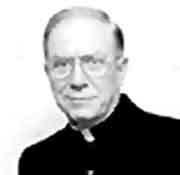 | Father Richard James Cleary was born and reared in Wichita. After graduation from Cathedral High School in 1947, he attended the seminary operated by the Benedictine monks of Conception Abbey in Northwestern Missouri. There he came to appreciate the life of the monks and, having obtained the permission of Bishop Mark Carroll of Wichita, he became a monk of that monastery. After being ordained a priest in 1955, his superiors sent him to get his master’s degree at the University of Ottawa, Canada, then to study in Athens, Greece, and then in Rome, Italy, where he obtained his doctor’s degree in Theology. Finally, he spent a year of study at Harvard University. Later, Fr. Cleary was assigned to teach for many years in Rome. In 1998, he returned to Wichita, where he served in parish ministry at St. Mary’s Cathedral and at Blessed Sacrament parishes. In 2001, his abbot (superior) transferred him to Arkansas, where he served as chaplain of the Benedictine Sisters of Holy Angels Convent in Jonesboro, and helped in the parishes of northeast Arkansas. In March 2010, he was re-assigned to his monastery, Conception Abbey, Conception, in Missouri 64433. He can be contacted there at, 660-944-2877, or by email: rjcleary@juno.com. |
Religion
2012-10-02 13:57:06
Is heaven a lonely place with disembodied souls?
Q- Many believe that at the end of time the body will be resurrected an rejoin the soul for all eternity. If this is so, and the soul has no physical presence by itself, won't heaven be a pretty lonely place until the end of the world happens? I mean the only ones there right now with a soul and body are God, and some believe the Blessed Virgin Mary, Enoch and Elijah.
A- This question is confused; but then so are many people, particularly when dealing with life after death, about which we have only sparse information from Jesus, who was in a position to know the facts, and from the disciples He taught. Evidently, the questioner believes the Apostles' Creed, which concludes: "I believe in . . . the resurrection of the body and life everlasting. Amen." It is true that, at the end of time, our bodies will be resurrected and rejoin their proper souls for all eternity. And it is true that the soul, being spiritual but real, has no physical presence by itself. But, by God's arrangement, the individual souls of those who have lived on earth are able to communicate by their intellect and will, and interact with their companions in heaven or purgatory or hell. There is no communication between the souls in heaven and those in hell. (Refer to Jesus' parable about the rich man and the poor man in St. Luke's Gospel, chapter 16: 19-31.) In Luke, chapter 19: 27-38 Jesus addresses a similar question raised by the Sadducees. The dead are like the angels of God: those who are children of God (verse 36) are rejoicing with the angels and the saints, all their friends old and new, and enjoying the beatific vision of God. As regard the dead whose souls are in hell: they are experiencing intense physical pain, utter loneliness and despair. Separated from God forever, they are like the devils, fallen angels, consumed with self-pity, hatred of others, and wallowing in the consequences of their sins which dragged them down to eternal punishment.
At the end of the world and the general resurrection, all persons, who have ever lived, will be reunited body and soul forever. All souls long for the completion of their person, which will happen at the resurrection. According to St. Thomas Aquinas, each person will rise in the fullness of their youth, which is a consolation for infants who die prematurely as well as for the aged. But their happiness or suffering is not in suspense until that final consummation. Pope John XXII in 1320 defined as a doctrine of faith that, immediately after death, the individual soul enters into heaven or hell. That doctrine allows for the temporary situation of Purgatory. The Catechism of the Catholic Church (Paragraphs 1030-1031) says that: "All who die in God's grace and friendship, but still are imperfectly purified of sins they committed, are indeed assured of their eternal salvation; but after death they undergo purification, so as to achieve the holiness necessary to enter the joy of heaven. The Church gives the name of Purgatory to this final purification of the saved, which is entirely different from the punishment of the damned." Pope St. Gregory the Great (509-604) wrote: "As for certain lesser faults, we must believe that, before the Final Judgment, there is a purifying fire. He Who is Truth says that whoever utters blasphemy against the Holy Spirit will be pardoned neither in this world nor in the world to come (cf Matthew 12:31). From this sentence we understand that certain offenses can be forgiven in this world, but certain other sins only in the world to come." Those who die with some attachment to sin on their soul pass into Purgatory (a temporary condition wherein the soul of a person, who is saved, undergoes purification of any remnants of sin and undue attachments to things of this world). Purgatory is not available for hardened sinners and those who die in grave sin without repenting.
The questioner is in error to say that God has a body. God is pure spirit. However, God's Son Jesus assumed a human body with a human soul, in which He resides in heaven. The Father and the Holy Spirit do not have bodies. As a special favor to the Virgin Mother of Jesus, God granted that her holy body not corrupt: so that holy Mary was assumed body and soul into heaven. Perhaps Enoch and Elijah also were granted resurrection in anticipation; but probably they had to return to earth and died, as do all other human beings in consequence of original sin.


